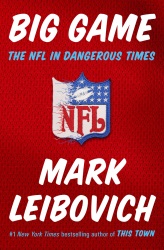

 I pushed open the bathroom stall door and discovered on the toilet
there a man who looked like Alex Trebek taking a shit. His gaze was locked in
the thousand-yard stare—like he was seeing an invisible atrocity unfold in the
distance but feeling nothing. A serious shitter. He did not maneuver his
eyeballs to see who it was that walked in on his most intimate moment.
I pushed open the bathroom stall door and discovered on the toilet
there a man who looked like Alex Trebek taking a shit. His gaze was locked in
the thousand-yard stare—like he was seeing an invisible atrocity unfold in the
distance but feeling nothing. A serious shitter. He did not maneuver his
eyeballs to see who it was that walked in on his most intimate moment. Mark Leibovich is The New York Times Magazine’s chief national correspondent. I am not a regular reader of his column, but I read his previous book, This Town, which I described as the author wallowing in the networking and social maneuverings.
Mark Leibovich is The New York Times Magazine’s chief national correspondent. I am not a regular reader of his column, but I read his previous book, This Town, which I described as the author wallowing in the networking and social maneuverings.He kids DC's political players about the unseemly side of their work but never condemns them. Leibovich paints an absurd picture and sort of shrugs it off. His easygoing prose makes a shrug seem like the natural reaction. This Town delivers the goods for political junkies—especially if you tracked national politics from 2007 to 2013. Hearing how embedded Washington correspondents are is discomfiting. But if disillusion has already set in, the disappointment in This Town lands softly.
One of the drivers in Jerry's employ, an African American gentleman named Emory, opened a back cabinet stocked with $250 bottles of "Blue." No doubt Jones could afford the smooth booze, but he also mentioned a qualifier. "It's the stuff it makes you do after you've had it that you might not be able to afford," he said. I relay this by way of transparency into Jones inhibitions, which after a few more supersized pours from Emory were weakening fast.
Leibovich asks Jones which means more: the Hall of Fame jacket or another Super Bowl ring. Jones, drunk, finally admits the jacket is more important to him.
Ward Cleaver: Oh, I guess its just all part of being a father, Beaver. Your boy makes the football team and you visualize him scoring touchdowns all over the place. He gets an A in mathematics, and you see him as an atomic scientist landing on the moon. Maybe you even picture him marrying the banker's daughter.
Theodore "Beaver" Cleaver: Gee, dad. I thought only kids had goofy dreams like that.
Ward: No, Beaver. Nope. Parents have their share, too. You see, as you grow older, you come to realize that some of the ambitions and dreams you had are just not going to come true. So, you begin to dream through your children.
Wally Cleaver: You mean Mr. Rutherford dreams through Lumpy?When actor Hugh Beaumont, as Ward, says, "you come to realize that some of the ambitions and dreams you had are just not going to come true," Beaumont's delivery includes a slight, magnificent quiver. It is an efficient but effective line read—not a surprise from the ultimate and classic TV dad-actor.
Ward: Of course he does. I don't guess there's a father around anywhere who doesn't want things to be a little better for his children than they were for him.
The 7:45 morning bus always arrives early, the 8:05 late. Someone plays her phone audio out loud on the ride. I get off at King Street metro station and wait for the yellow line to Greenbelt. After Pentagon station, the train surges out of Virginia across the Potomac—my favorite part of the commute. Looking out to see dulled light glancing off hard bridges, rough, sectarian waters, and wildly uneven expectations. I see the mild winter morning sinking the bots in their cars moving from A to B. I think of how every day I take the subway to and from work, but each time I ride, I feel like it takes me farther and farther from home.
At Len'fant Plaza station I crowd off the yellow line to catch the next train west to Capitol South. And, there, young blood marches to Congress for another day of legislating and messaging. They moved from somewhere in the top of their class down into the tunnels beneath this pyramid where they scratch walls and people, where they keep tradition alive, where everyone else can lick heels.
Rolfe Whitehouse (Dafoe): I was always careful around Pop. I was a careful child. And I'm a careful adult. But at least I was never afflicted with that man's anger.
Wade Whitehouse (Nolte): That's what you think.
This so-called conversation has a few interesting parts, but this statement stood out to me. The whole civility discussion. When she was a real judge working in New York City's child welfare system, Judith Sheindlin was accused of being insensitive. Real Judge Judy was trying to scold and scare lazy social workers, addict parents, and wayward kids into doing what she thought was right. But it was only going to get worse, so she took her chance to cash in.I did my first interview for 60 Minutes 26 years ago, and Morley Safer said to me, “What direction do you think it’s all going in, and will it get any better?” And I said to him, “It’s going to get worse. A lot worse.” It’s like what you said before—you watch my program because there’s linear thinking. But there is an element of dumbing down that has been embraced by others, which suggests to me that these rules of civilization are being dulled.